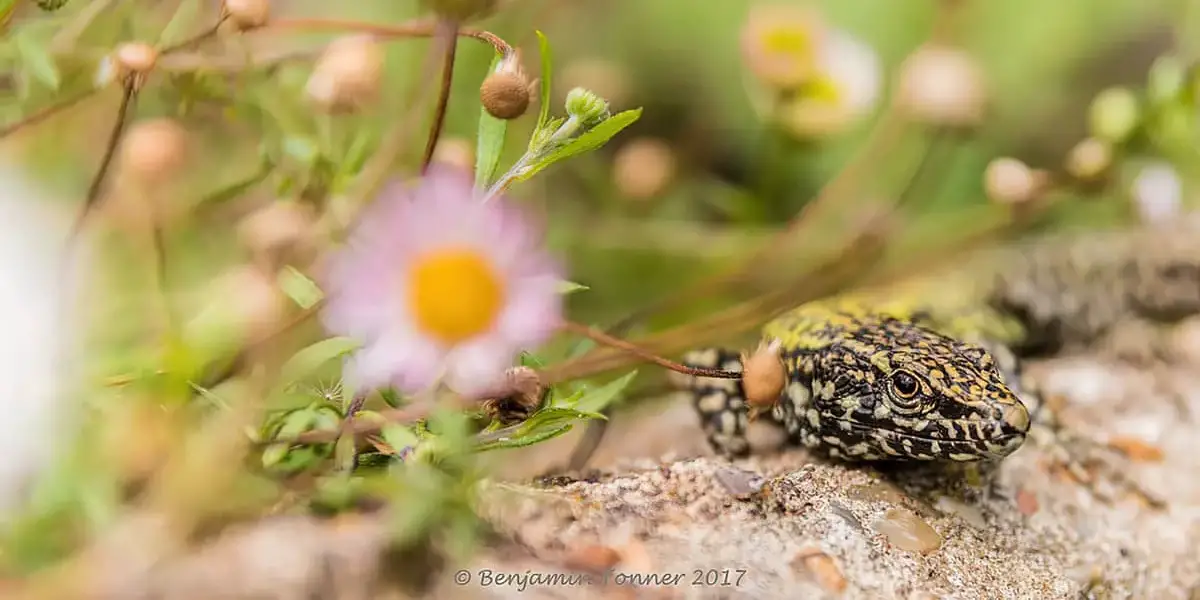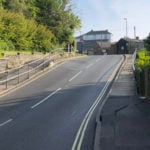Island Roads has said it will ‘consider’ new sightings of wall lizards in Ventnor to see if modifications are needed to its glyphosate-based spraying regime, but have failed to make a commitment for change.
Readers will remember that in the summer of 2023, News OnTheWight launched a citizen science project aimed at extending the protection zone for colonies of wall lizards from glyphosate-based weedkiller.
The wall lizards have been busy reproducing and expanding their colonies, and through personal experience as well as anecdotal evidence from residents, it has become very clear that the Island Roads’ no-go zones for spraying needs extending.
Solutions-based journalism
In an attempt at see a positive outcome from the citizen science project, News OnTheWight has approached this issue as a piece of solutions-based journalism.
Once residents had completed adding their sightings of new colonies to the crowd-sourced map (marked in yellow), News OnTheWight got in touch with Island Roads (the highways PFI contractor) to share the findings. As can be seen from the screen grab below, the colonies have expanded far beyond Island Roads’ no go spraying zones (marked in orange).
The desired outcome would be for Island Roads to use the new data to improve its protection of the wall lizards, which it already acknowledges, through actions described below, need protection.

Support from all town councillors
In addition, News OnTheWight included a statement of support from the Mayor, Steve Cooper (on behalf of Ventnor Town Council), who said,
“Ventnor Town Council are dedicated to supporting the increase of all biodiversity and as Ventnor is so fortunate to have wall lizards, we fully support the halting of spraying of glyphosate-based weed killer wherever wall lizard colonies exist.”
Island Roads respond
The response News OnTheWight received from Island Roads was disappointing.
Although it says it will consider the updated sightings, Island Roads will not commit to making the necessary changes to protect the expanded colonies.
Island Roads told News OnTheWight,
“Island Roads takes its environmental responsibilities very seriously. We are well aware of the wall lizard population and on several sites in Ventnor we have either left gaps during re-pointing of walls or installed special lizard caves to provide additional habitat for these reptiles.
“The way we use glyphosate in the area has also been developed over several years with the welfare of wall lizards in mind.
“It is also worth noting that spray is only applied at ground level – ie where the road meets the footway and when the footway meets a wall. In the latter case, spray is not used when the footway meets a stone wall which typically provide the preferred habitat for wall lizards.
“On all walls above ground level, vegetation is removed by hand – no glyphosate, nor any other chemical, is used.
“Also, the concentration of glyphosate we use is extremely dilute – 2% or less of the applied spray and the spray is applied no more than three times a year.
“This regime has evolved a result of feedback on this issue. While we do not believe glyphosate is harmful to wildlife as applied by us, we nevertheless are happy to take additional precautionary steps, not least to re-assure the public.
“Currently this regime is in place for areas previously identified as providing known habitat for wall lizards – typically the stone walls retaining land behind the Esplanade / La Falaise car park. We will of course consider the new sightings as presented by News OnTheWight to see if further modifications to our spraying regime are required.”
Why the lack of commitment?
Although the response (which took two weeks to arrive) was a step forward, given the lack of commitment to changing the spraying regime, News OnTheWight replied,
“As we know from anecdotal evidence, and sightings by ourselves, the operatives drive along the road or footway at speed, spraying as they travel through the streets, so the pesticide is in the air.
“They don’t travel along slowly, only spraying directly where they need to.
“Can IR advise why they are not committing to avoid spraying in the new areas identified, rather than just considering it?
“‘Considering’ doesn’t mean they are going to act on it. Meanwhile, residents are rightly concerned that the lizard population will be impacted by the spraying.”
That was nine days ago, and Island Roads have still failed to respond.
Background
News OnTheWight first started reporting on the use of Glyphosate in 2016, when the former Green MEP, the late Keith Taylor, highlighted how the European Union had postponed the re-authorisation of the world’s most widely used herbicide.
Two years later and despite a £289 million San Francisco court ruling which claimed the weedkiller Roundup (which contains Glyphosate) ‘substantially’ contributed to a man’s terminal cancer, the Island Roads continued to use the chemical across the Island.
Call for a ban
In 2019 there was a call for the ban of Glyphosate after more dead wall lizards were discovered in areas after the weed killer had been sprayed, but Island Roads and the Isle of Wight council would not budge.
The argument about the use of Glyphosate has continued to remain in the news: with more calls to ban the use of it, confusion over the terms of the PFI contract, the Cabinet member responsible stating that it’s not a binary issue, and Ventnor Town council agreeing to ban the use of it by their contractors, but at a cost.
Below is the document that Island Roads’ operatives work to, showing the roads and areas they avoid spraying.





